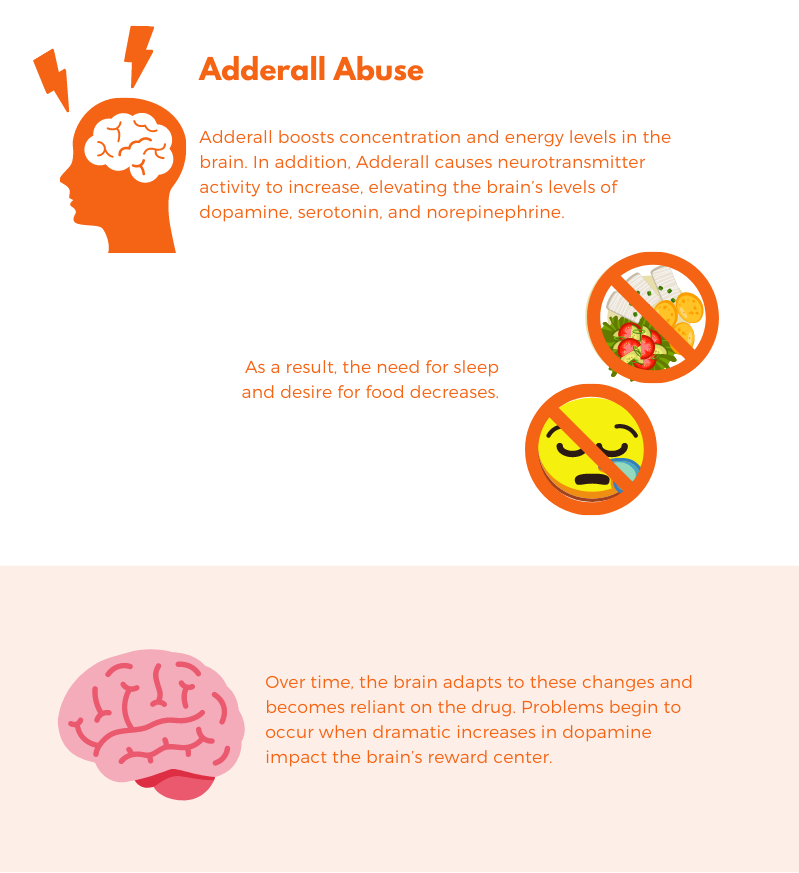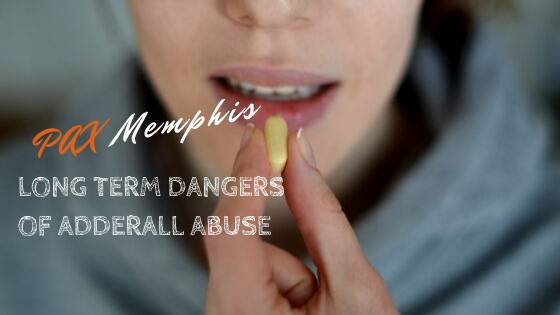Adderall is a stimulant drug that is used to treat Attention Deficit Disorders (ADD). Even though it is an FDA approved prescription, recreational use poses serious health risks. When Adderall is abused or taken illicitly, it can increase the chances of a physical and psychological dependence on the drug. Consequently, it’s side effects range from damage to the brain, organs, and other important bodily systems.
How Long Term Adderall Abuse Changes the Brain

When the reward center is impacted by increasing and decreasing amounts of dopamine, the ability to experience pleasure without the help of stimulant drugs decreases. Users often begin to use more and more of the drug, and the changes in the brain become more extreme. As more Adderall is consumed, tolerance towards the drug increases and the body stops functioning normally without it. As a result, individuals who abuse Adderall over an extended period of time will have to take increasing amounts of the drug to achieve the desired effects.
The lack of natural dopamine formation can result in any or all of the following symptoms:
- Depression
- Lack of motivation
- Irritability
- Lethargy
- Fatigue
- Aggression
- Suicidal thoughts
Tolerance, Chemical Dependency, and Withdrawals
Individuals who regularly abuse Adderall over an extended period of time often become dependent on the drug. The chemical dependency will result in withdrawal symptoms and intense cravings after Adderall leaves the bloodstream.
There are several factors that determine the level of dependency that users experience, including:[2]
- Length of time Adderall abused
- Amount of dosage
- Method of use (i.e, swallowing, crushing, snorting, injecting)
- Mental health
- Physical health
- Biological history of addiction within the family
A person who has abused Adderall for 2 years who injects the drug multiple times a day will have a higher tolerance and worse withdrawal symptoms than somebody who has abused Adderall for 6 months at a lower dose and swallows the drug. Whatever the case may be, Adderall addiction is dangerous.
Withdrawals occur when a person who is dependent on a drug no longer has the drug in their system. When it comes to Adderall withdrawals, the most noticeable withdrawal symptoms are usually the psychological ones, like depression, irritability, and lethargy. However, other symptoms of Adderall withdrawal include:
- Mood swings
- Insomnia
- Fatigue
- Nausea
- Stomach aches
- Cramping
- Vomiting
Long Term Effects of Adderall Abuse
If Adderall addiction isn’t treated early on, it can lead to several dangerous long term effects. In rare cases, severe Adderall abuse can result in psychosis, paranoid delusions, hallucinations, and extreme mood and behavioral disturbances. Additionally, panic attacks can be provoked as a result of long-term Adderall abuse. Individuals who have a history of mental illness may experience heightened symptoms that increase over time as stimulants are abused.[3]
The more common side effects of long-term Adderall abuse include:
- Weight loss
- Abdominal pain
- Constipation
- Dizziness
- Dry mouth
- Headaches
- Skin discoloration
- High blood pressure
- Vision problems
- Difficulty breathing
- Hyperactivity
- Tremors
- Heart palpitations
- Heart disease
After prolonged Adderall abuse, the heart muscle can be weakened causing serious medical complications. Heart complications combined with changes in the brain, mood, and behaviors, Adderall abuse can continue to take a devastating toll on the body. The damage will continue and progress until individuals detox and stop using the drug.
Treatment for Adderall Addiction
Long-term Adderall abuse can not only damage the body, but it can lead to addiction. The first and most important step in overcoming Adderall addiction is to seek professional help. Fortunately, treatment specialists at PAX Memphis Recovery Center can help.
Before treatment begins, it is important to check into detox. Detox will ensure that the body is safely detoxed from all traces of stimulants. Adderall withdrawal can be extremely difficult due to the mental torment that can occur. However, detoxing from Adderall in a medical setting can help mitigate many of the symptoms of Adderall withdrawal. Clients in detox will be monitored around to clock to ensure their safety and comfort during detox.
After detox, it is important to continue the recovery process at an accredited drug rehab center. Licensed addiction specialists will provide individuals with the tools needed to achieve lasting sobriety through a variety of behavioral therapies. Therapy that is beneficial in addiction treatment includes cognitive-behavioral therapy (CBT). dialectical-behavioral therapy (DBT), individual therapy, and group therapy. A good drug rehab center will help their clients understand the root causes of addiction and how to stay sober.
Addiction doesn’t happen overnight and neither does recovery. Instead, it is important to participate in a continuum of care after treatment. Aftercare programs will consist of intensive outpatient programming (IOP), outpatient programming (OP), and active participation in a 12-step program.
“When you enter our PHP drug and/or alcohol treatment program our doctors and addiction specialists will assess your individual needs and concerns. They are well versed in treating substance abuse problems of all types. We will also make sure to provide you a safe and comfortable environment for your treatment and we promise you will be treated with respect and dignity by all of our friendly staff members. Clients are assisted with case management services tailored towards helping clients establish or re-establish healthy daily living habits that were negatively impacted during their addiction.”
If you or a loved one is struggling with Adderall addiction, contact the treatment professionals in Memphis today.
Resources:
Medically Reviewed: September 25, 2019

All of the information on this page has been reviewed and verified by a certified addiction professional.










